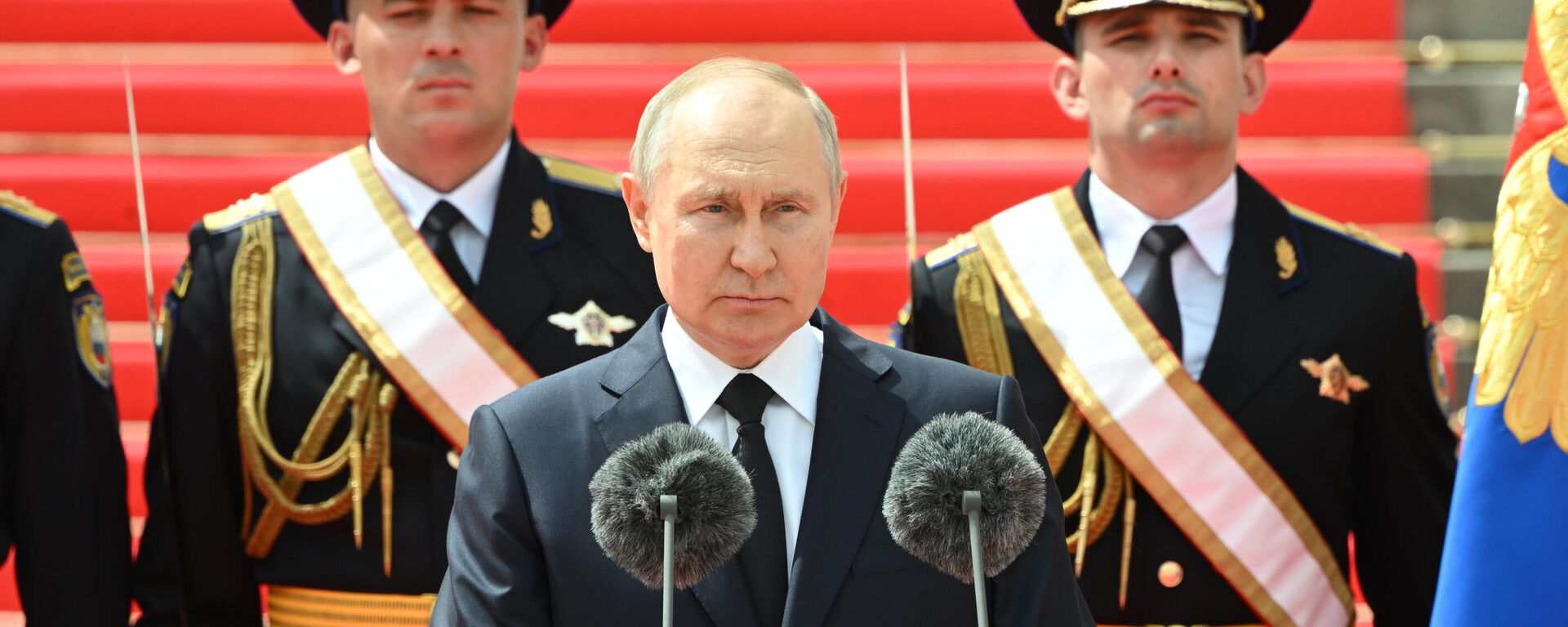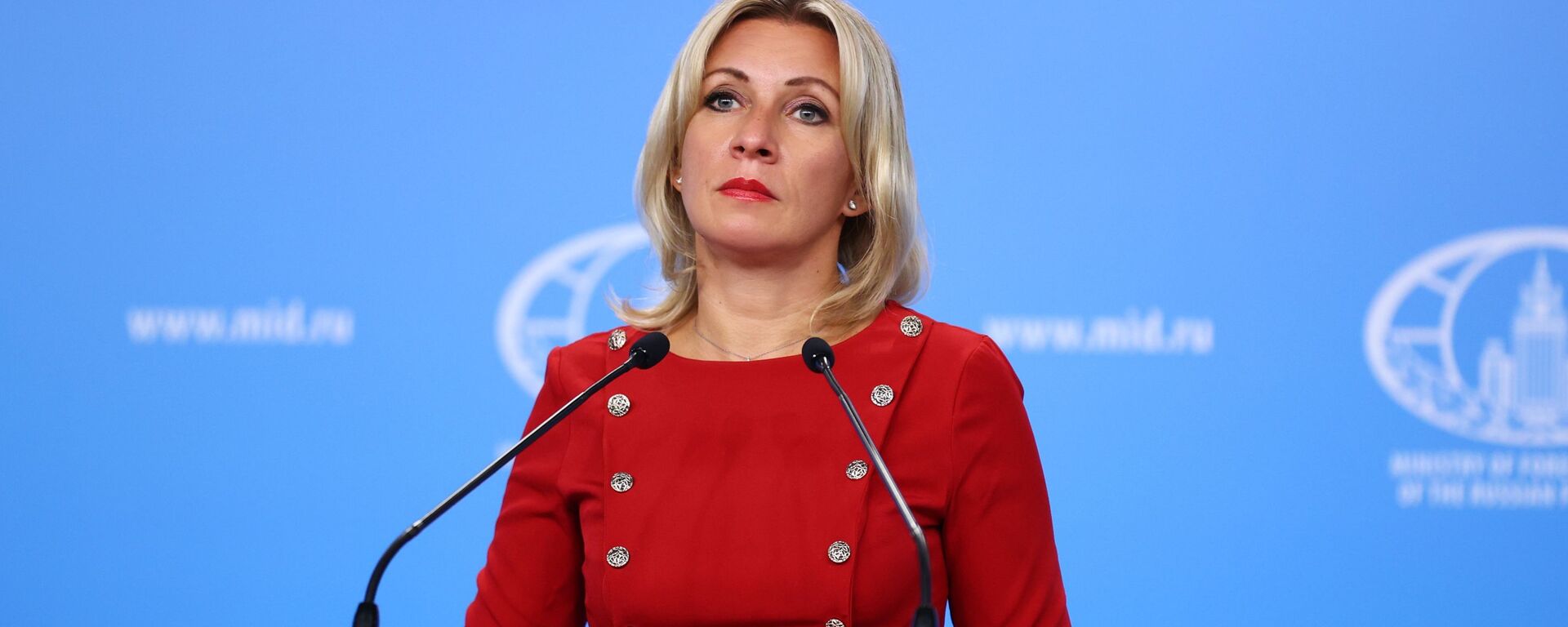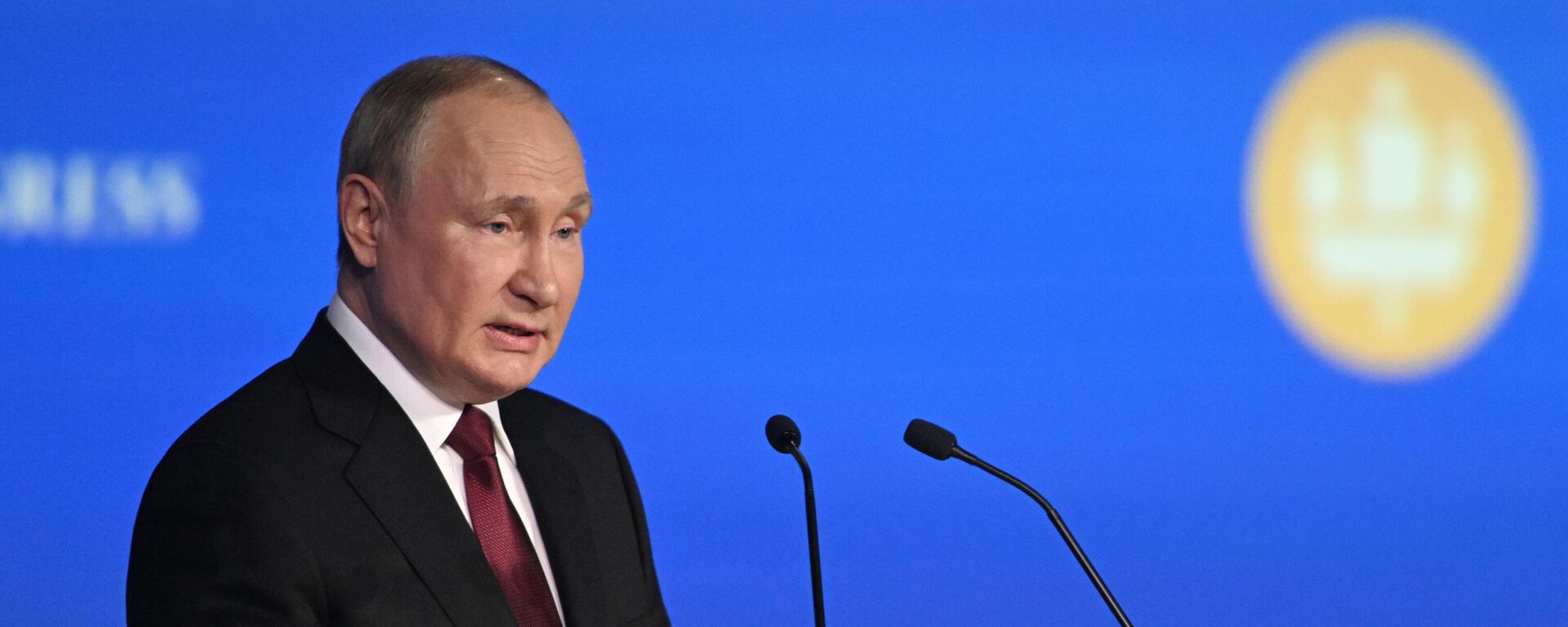https://sputnikglobe.com/20240227/russophobic-elements-in-us-congress-set-to-lose-influence-amidst-moscows-strength-1117003301.html
Russophobic Elements in US Congress Set to Lose Influence Amidst Moscow's Strength
Russophobic Elements in US Congress Set to Lose Influence Amidst Moscow's Strength
Sputnik International
US backing for Ukraine is proving increasingly unpopular in Congress and among the American electorate, but will Langley bend to the democratic will?
2024-02-27T03:50+0000
2024-02-27T03:50+0000
2024-02-27T04:14+0000
ukraine crisis
analysis
us hegemony
us
russia
ukraine
ukrainian crisis
ukrainian conflict
us arms for ukraine
mercenaries
https://cdn1.img.sputnikglobe.com/img/07e8/02/1b/1117004243_0:0:3074:1730_1920x0_80_0_0_1e20509d01447357fd8a636fe9ab454d.jpg
A number of Western analysts in recent days have acknowledged Ukraine is losing in the Donbass. The observation was made in a weekend article in the Greanville Post, which noted former US Army Col. Lawrence Wilkerson and the Quincy Institute’s Anatol Lieven were among those admitting the failure of the US-backed proxy conflict.The state of affairs has again raised the prospect of a long-awaited negotiated end to hostilities as a generation of young Ukrainian men are sacrificed for Washington’s provocation towards Moscow. “There really won't be much to negotiate,” said Wilmer Leon, host of Sputnik’s The Critical Hour program, on Monday. “It's going to be ‘surrender or continue,’ taking these missiles in the teeth.”“Well, yes and no,” responded Scott Ritter, a former Marine Corps intelligence officer who has become a harsh critic of US foreign policy. “At the end of the day, it's going to be a surrender [for Ukraine].”Ritter noted that Russia has a significant leverage to force concessions from Kiev, comparing their position to that of the United States in World War II before former President Harry Truman made the decision to drop atomic bombs on Hiroshima and Nagasaki.But Ritter claimed Moscow would ultimately seek a more conciliatory approach than that of the United States toward Japan in 1945.“It's not in Russia's interest to have a permanent state of conflict with Europe, to be on a perpetual war footing,” Ritter added, claiming the country would prefer to devote resources towards domestic concerns rather than weapons production.Such dynamics would create “significant maneuver room” in negotiations between Moscow and Kiev according to the analyst.Ritter speculated that rapprochement would be reached first with Europe as business interests across the continent press to rebuild economic links. European countries were badly harmed by US-backed sanctions on Russian gas, which drove energy costs sky high from London to Berlin. The global energy market has yet to fully recover, with Qatar recently announcing increased investment in liquified natural gas production to help meet demand.Additionally, the expert said Europe’s leaders will find the prospect of engagement with the BRICS nations too tantalizing to ignore. Western sanctions forced Russia to strengthen ties with countries throughout the Global South, especially China and India. Moscow now serves as a “gateway economy” to the BRICS bloc, whose share of global GDP recently surpassed that of the G7 countries.Ritter claimed the United States will also face pressure to restore relations with Moscow, especially as the Kiev regime's efforts to weaken Russia prove futile. A recent Fox News interview with Ukrainian President Volodymyr Zelensky only received about 24,000 hits online, while journalist Tucker Carlson’s sitdown with Russian President Vladimir Putin received almost one billion. The discrepancy demonstrates the ineffectualness of Western propaganda efforts in recent months.Meanwhile, even Western mercenaries have proven unable to turn the tide in Ukraine’s favor. Former Prime Minister Dimitri Medvedev recently claimed Russia should capture Kiev, illustrating Moscow’s optimism about its prospects on the battlefield. Observers say Russia’s heavy advantage in soldiers and firepower put the country in a highly advantageous position.“But we also know that Congress plays a very important role in shaping policy and the tone of policy,” noted Ritter. “Donald Trump spoke about ‘why can't we be friends with Russia’ and then found that his hands were tied by a Congress that just didn't want to be friends with Russia.”Although voices in Congress on both sides of the aisle are increasingly voicing opposition to US support for Kiev, Western intelligence agencies may prove far more resistant to change. A recent New York Times article revealed the depth of the CIA’s decade-long involvement in Ukraine, likely suggesting the US Deep State isn’t ready to admit defeat just yet.Such powers behind the scenes have proven highly persuasive in dictating US foreign policy in years past. “The United States, as an entity, has shown itself to be a negotiation partner who negotiates in bad faith,” Ritter observed.
https://sputnikglobe.com/20240227/putin-was-right-western-complicity-in-ukraines-terrorism-proves-wisdom-of-special-operation-1117001814.html
https://sputnikglobe.com/20231130/osce-understands-impossible-to-discuss-europes-fate-without-russia-1115309273.html
https://sputnikglobe.com/20230607/putin-addresses-2023-st-petersburg-international-economic-forum-1110980845.html
russia
ukraine
Sputnik International
feedback@sputniknews.com
+74956456601
MIA „Rossiya Segodnya“
2024
John Miles
https://cdn1.img.sputnikglobe.com/img/07e8/01/19/1116388787_0:0:1316:1316_100x100_80_0_0_77e70d36afd983012b1c5d38ddb84156.jpg
John Miles
https://cdn1.img.sputnikglobe.com/img/07e8/01/19/1116388787_0:0:1316:1316_100x100_80_0_0_77e70d36afd983012b1c5d38ddb84156.jpg
News
en_EN
Sputnik International
feedback@sputniknews.com
+74956456601
MIA „Rossiya Segodnya“
Sputnik International
feedback@sputniknews.com
+74956456601
MIA „Rossiya Segodnya“
John Miles
https://cdn1.img.sputnikglobe.com/img/07e8/01/19/1116388787_0:0:1316:1316_100x100_80_0_0_77e70d36afd983012b1c5d38ddb84156.jpg
urkaine crisis, ukrainian troops, ukrainian losses, russian forces, russian troops, russia wins, ukraine loses, ukrainian crisis, failed counteroffensive, ukrainian counteroffensive, russian economy under sanctions, us sanctions, sanctions on russia, sanctions against russia, us hegemony, unipolar world, russophobia, russophoby, anti-russian bias, russiagate
urkaine crisis, ukrainian troops, ukrainian losses, russian forces, russian troops, russia wins, ukraine loses, ukrainian crisis, failed counteroffensive, ukrainian counteroffensive, russian economy under sanctions, us sanctions, sanctions on russia, sanctions against russia, us hegemony, unipolar world, russophobia, russophoby, anti-russian bias, russiagate
Russophobic Elements in US Congress Set to Lose Influence Amidst Moscow's Strength
03:50 GMT 27.02.2024 (Updated: 04:14 GMT 27.02.2024) US backing for Ukraine is proving increasingly unpopular in Congress and among the American electorate, but will Langley bend to the democratic will?
A number of Western analysts in recent days have acknowledged Ukraine is losing in the Donbass. The observation was made in a weekend
article in the Greanville Post, which noted former US Army Col. Lawrence Wilkerson and
the Quincy Institute’s Anatol Lieven were among those admitting the failure of the US-backed proxy conflict.
The state of affairs has again raised the prospect of a long-awaited negotiated end to hostilities as a generation of young Ukrainian men are sacrificed for Washington’s provocation towards Moscow. “
There really won't be much to negotiate,” said Wilmer Leon, host of
Sputnik’s The Critical Hour program, on Monday. “It's going to be ‘surrender or continue,’ taking these missiles in the teeth.”
“Well, yes and no,” responded Scott Ritter, a former Marine Corps intelligence officer who has become a harsh critic of US foreign policy. “At the end of the day, it's going to be a surrender [for Ukraine].”

27 February 2024, 00:55 GMT
Ritter noted that Russia has a significant leverage to force concessions from Kiev, comparing their position to that of the United States in World War II before former President Harry Truman made the decision to drop atomic bombs on Hiroshima and Nagasaki.
“It's going to be unconditional surrender,” said the former UN weapons inspector. “I don't believe the Russians are going to sit there and say, 'well, you can keep some Banderites here. You can keep this NATO army here.' No, those are gone.”
But Ritter claimed Moscow would ultimately seek a more conciliatory approach than that of the United States toward Japan in 1945.
“Russia also wants to rapidly transition from conflict termination to ‘how do we repair relations with Europe, how do we get away from this war footing?’” he said.
“It's not in Russia's interest to have a permanent state of conflict with Europe, to be on a perpetual war footing,” Ritter added, claiming the country would prefer to devote resources towards domestic concerns rather than weapons production.

30 November 2023, 16:22 GMT
Such dynamics would create “significant maneuver room” in negotiations between Moscow and Kiev according to the analyst.
Ritter speculated that rapprochement would be reached first with Europe as business interests across the continent press to rebuild economic links. European countries were badly harmed by US-backed sanctions on Russian gas, which drove energy costs sky high from London to Berlin. The global energy market has yet to fully recover, with Qatar
recently announcing increased investment in liquified natural gas production to help meet demand.
Additionally, the expert said Europe’s leaders will find the prospect of engagement with the BRICS nations too tantalizing to ignore. Western sanctions forced Russia to strengthen ties with countries throughout the Global South, especially China and India. Moscow now serves as a “gateway economy” to the BRICS bloc, whose share of global GDP recently
surpassed that of the G7 countries.
“What's happening in Saint Petersburg is reality; what's happening in Davos is fiction,” said Ritter, claiming the Russian city’s yearly economic forum is “determining the direction of the global economy.”
Ritter claimed the United States will also face pressure to restore relations with Moscow, especially as the Kiev regime's efforts to weaken Russia prove futile. A recent Fox News interview with Ukrainian President Volodymyr Zelensky only received about 24,000 hits online, while
journalist Tucker Carlson’s sitdown with Russian President Vladimir Putin received almost one billion. The discrepancy demonstrates the ineffectualness of Western propaganda efforts in recent months.
Meanwhile, even
Western mercenaries have proven
unable to turn the tide in Ukraine’s favor. Former Prime Minister Dimitri Medvedev recently claimed Russia should capture Kiev, illustrating Moscow’s optimism about its prospects on the battlefield. Observers say Russia’s heavy advantage in soldiers and firepower put the country in a highly advantageous position.
“But we also know that Congress plays a very important role in shaping policy and the tone of policy,” noted Ritter. “Donald Trump spoke about ‘why can't we be friends with Russia’ and then found that his hands were tied by a Congress that just didn't want to be friends with Russia.”
“And so ultimately we're going to have to purge the American body politic,” he claimed. “We're going to need to see not just a change in presidential administrations, but we're going to have to see a thinning out of the Russophobic blood in Congress, and this could take several election cycles,” Ritter clarified.
Although voices in Congress on both sides of the aisle are increasingly voicing opposition to US support for Kiev, Western intelligence agencies may prove far more resistant to change. A recent New York Times article
revealed the depth of the CIA’s decade-long involvement in Ukraine, likely suggesting the US Deep State isn’t ready to admit defeat just yet.
Such powers behind the scenes have proven highly persuasive in dictating US foreign policy in years past. “The United States, as an entity, has shown itself to be a negotiation partner who negotiates in bad faith,” Ritter observed.






